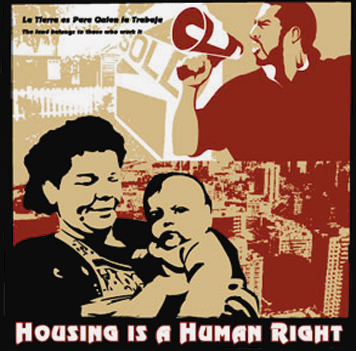by Tim Gee
[dropcap]I[/dropcap]t would seem that the Olympics are inescapable. Everywhere I turn in the United States, I see Olympic T-shirts, adverts or product tie-ins. To me, though, Olympic imagery does not inspire feelings of excitement or anticipation. It prompts feelings of dismay and double-standards.
There is another side to the Olympics, and it hits very close to home.
I am an author, an activist and a blogger from Britain, currently traveling the states, giving talks about my book Counterpower. Not long before I left the UK, I lived a short walk from the site of this summer’s London Olympics. But for the duration of the games, my home will be friends’ houses, and the road.
Ever since the time of the Olympic bid, people in East London have been told optimistic stories of how the event would “regenerate” the area to “benefit everyone who lives here” by “reducing poverty, supporting healthier lifestyles and developing successful neighbourhoods.”
But on the strength of events so far, it is doing the exact opposite. It began with stories in the media of landlords evicting their tenants to make way for Olympic lets, prompting a wider rents crisis.
Then it hit us: a 30 percent increase (justification: “we’re entitled to charge the market price”) followed by evictions. The flat-hunt that ensued revealed an average one-bed flat in the borough where I work to cost more than my entire salary — or that of most low-paid workers.*
When being shown round possible flats to live in — usually by estate agents when the residents were out at work — the rent notices stuck up on fridges were hard to miss. A whole domino-rally of downsizing has been set off. When the story broke about East Londoners living in sheds, some people outside of the capital were surprised. In London it is just life.
But the double-speak doesn’t end there. The second promise was “successful neighbourhoods.” Vague as this sentiment is, the militarization of my hometown was not what I had in mind.
We have been told that there will be more soldiers on duty in London than there are currently in Afghanistan and guns placed on the roofs of residential blocks. The use of pre-emptive banning orders used to stop protests and badly trained and aggressive security guards has already begun.
So what about those healthier lifestyles? Putting aside the increased air pollution for a moment, it does seem likely that there will be more walking and cycling. Cheerful cartoons on buses and trains feature obedient citizens opting not to take public transport, accompanied by a euphemistic warning of “transport hotspots on event days.” Yet the alternative, car-free, canal pathways are going to be closed down. Officials say this is on security grounds. Locals suspect it is a ruse to prevent any passerby from glancing into events without paying.
Even on the roads, cyclists are being threatened with fines of £200 ($300) should they stray into one of the 108 miles of VIP lanes reserved for exclusive use by Olympic participants and sponsors.
And this is where insult is added to injury: some of the sponsorship deals go beyond irony. The “official sustainability partner” is BP. Thousands of community-spirited local volunteer stewards will have no choice but to advertise fast-food giant McDonalds on their clothes. And despite the Olympic spirit of fair play, official sportswear partner Adidas stands accused of maltreating its workers.
There has been some resistance. One cheeky campaign group raised a smile when they satirized the partnership deals by declaring themselves “the official protesters of the Olympic games.” The London Organizing Committee ordered the group’s Twitter account to be dismantled on “brand affiliation” grounds, only for it to be reinstated with thousands more followers as a result of the media furor that ensued.

There has been some resistance. One cheeky campaign group raised a smile when they satirized the partnership deals by declaring themselves “the official protesters of the Olympic games.” The London Organizing Committee ordered the group’s Twitter account to be dismantled on “brand affiliation” grounds, only for it to be reinstated with thousands more followers as a result of the media furor that ensued.
Another group put out a spoof press release declaring that BP had pulled out of its role as sustainability partner, and managed to give a live radio interview before they were outed. On the streets, community-led human rights groups are training legal observers to record police actions during the period. Meanwhile, the housing charities are putting extra resources into supporting (former) residents in the affected areas.
But while actions that highlight the hypocrisy of Olympics organizers and support the victims are useful, the problem is much deeper. In a way, the Olympics have only intensified the effects of the poisonous cocktail of corporate power and authoritarian government that has been building in Britain and across the world for the past few decades.
One-time Olympic competitor Julian Boykoff calls it “celebration capitalism.” Building on Naomi Klein’s theory of the “Shock Doctrine,” he argues that corporate and government élites now use sporting events as well as major disasters to tighten their hold on power.
But perhaps these events are also symptomatic of a system approaching the end of the line. In a comparative study of the decline of 11 different empires, John Glubb argues that when empires enter their final phase, they are characterized by something he describes as truly surprising: the exaggerated importance of sporting events as an attempt to distract populations from other issues.
Let us hope that his observation has predictive capabilities. Then, like the remains of the Hippodrome of Constantinople, the Olympic Park of London will one day serve as a reminder to future generations that the people and ideas that dominate and suppress a society cannot do so forever.
[hr]
Tim Gee is the author of Counterpower: Making Change Happen, New Internationalist. It is available from The Green Arcade Bookstore in San Francisco.
